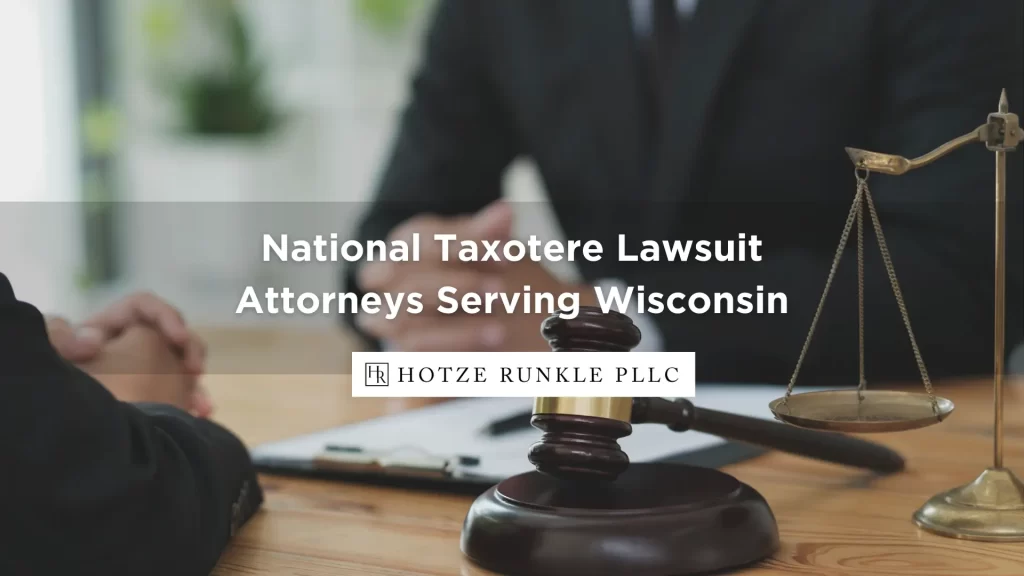
Did you or a loved one develop canalicular stenosis, epiphora, or another severe eye problem due to the chemotherapy drug Taxotere? If so, the Wisconsin attorneys of Hotze Runkle PLLC are ready to help you get the full and fair compensation you deserve.
Many people suffer from side effects after taking Taxotere. Taxotere is a chemotherapy drug administered intravenously by a physician. It belongs to a class of drugs known as taxanes, and researchers often refer to it as a plant alkaloid. Oncologists use it in the treatment of cancer of the breast, lung, prostate, stomach, head, and neck.
The FDA approved the use of the drug back in 1996. Manufacturer Sanofi-Aventis created it to prevent cancer cells from growing and spreading throughout the body. Initial studies performed on cancer patients showed the effectiveness and overall success in increasing life expectancy compared to other popular chemo drugs.
It wasn’t until years later that medical researchers found a link between Taxotere and adverse side effects in breast cancer survivors. That led to thousands of lawsuits against Sanofi for manufacturing a drug without releasing the appropriate warning labels. In Complaints filed by cancer patients and survivors, they stated that the pharmaceutical company knew about its drug’s harmful symptoms, but failed to reveal them to the consumers.
What is Canalicular Stenosis?
Symptoms typically begin during ongoing Taxotere treatments. It starts with excessive eye-watering, known as epiphora. Breast cancer survivors noted this as the most common symptom they experienced throughout chemo. Most patients assumed it was a common side effect of their treatment and would resolve on its own. However, epiphora symptoms could develop into something more serious.
Lacrimal glands located above your eyes create tears. Every time you blink, your tears spread across the surface of your eye and drain into the corners of your upper and lower lids. They then pass through small passageways called canaliculus before funneling into your nasal cavity.
When functioning correctly, your tears repeat this process throughout the day without any issues. If there’s any inflammation of the canaliculus, it’s unable to funnel tears into the nasal cavity like normal. Instead, the tears build up in your eye and run down your face.
Situations of chronic inflammation could lead to an infection. If left untreated, that infection causes a blockage in the canaliculus. When this vital structure in the eye becomes blocked, it leads to canalicular stenosis.
Canalicular stenosis is an ocular condition resulting from an obstruction of the canaliculus. Symptoms range from mild to severe and include the following:
- Consistent watery eyes (epiphora)
- Excessive tears
- Central vision loss (cystoid macular edema)
- Sensitivity to light
- Irritation or infection
- Eyelid swelling
- Headaches
- Blurred or cloudy vision
- Dry eyes
Some breast cancer survivors diagnosed with canalicular stenosis say that their symptoms don’t affect their daily lives too much. For others, the symptoms experienced routinely interfere with simple tasks. Activities like driving, reading, applying makeup, or working are all negatively impacted because of their medical condition.
How Does Taxotere Cause Eye-Watering and Other Related Symptoms?
The medical researchers that discovered the link between Taxotere and symptoms of canalicular stenosis published articles detailing their findings. Throughout the study, they reviewed the reaction of the chemo drug with a person’s body.
As an intravenous medicine, it travels through the bloodstream and interacts with various bodily fluids, such as urine, vomit, feces, and tears. That direct contact causes secretions of Taxotere to mix with the tears as they travel through the different structures of the eye. As a result, eye irritation occurs, which leads to inflammation and obstruction of the canaliculus.
What Should I Do If My Doctor Diagnosed Me with Canalicular Stenosis?
Sadly, most people don’t get the treatment they need for their symptoms until it’s too late. Epiphora and canalicular stenosis are entirely preventable when caught early enough. If you develop any of the symptoms, you should notify your oncologist and undergo an evaluation by an ophthalmologist immediately.
If your ophthalmologist diagnoses you with Canalicular Stenosis, but it’s still in its early stages, it’s possible to manage your symptoms. A temporary stent inserted into the eye could prevent the canaliculus from closing. That stent would remain there until around four to six weeks after your Taxotere treatment concludes.
In situations where the closure of one or both canaliculi occurs, options are limited. DCR, dacryocystorhinostomy is a procedure that creates a new passageway for tears. During the surgery, the doctor cuts a hole in a nasal bone to redirect tears away from the obstructed canaliculus. If necessary, a stent gets positioned to facilitate the flow of tears.
In extreme situations where the canaliculi become too damaged, CDCR might be necessary. Like DCR, conjunctivodacryocystorhinostomy involves creating a new channel, so tears avoid the obstructed canaliculi. The ophthalmologist places a glass tube (Jones tube) where the canaliculus was, so tears drain into the nasal cavity.
Both surgeries are invasive and expensive and often ineffective. Just like any other medical procedure, there are associated risks to undergoing DCR or CDCR. Potential hazards of the two surgeries include:
- Permanent facial scars
- Eye irritation and infection
- Uncontrolled bleeding during and after surgery
- Blindness from tissue damage
- The body’s rejection of the stent or Jones tube
- Migration of the stent or Jones tube within the ocular cavity
- Unsuccessful procedure
When you discuss your symptoms with an ophthalmologist, he or she will advise you on your options. They will perform a thorough evaluation to determine if surgery is right for you. In a lot of situations, there’s no solution to alleviate the side effects. Preventative measures are crucial in preventing long-term damage from occurring.
How Do I Know if I Qualify for a Lawsuit?
 Taxotere is a defective product that would fall under the category of product liability in a legal case. A statute of limitations is the time frame for which legal action can get brought against another party. In Wisconsin, the statute of limitations for product liability is three years. That means you must file a lawsuit against Sanofi-Aventis within three years of the date of your injury. If three years pass, you lose the right to seek compensation.
Taxotere is a defective product that would fall under the category of product liability in a legal case. A statute of limitations is the time frame for which legal action can get brought against another party. In Wisconsin, the statute of limitations for product liability is three years. That means you must file a lawsuit against Sanofi-Aventis within three years of the date of your injury. If three years pass, you lose the right to seek compensation.
To sue a company for their defective product, you must prove negligence existed. Negligence is a person or entity’s failure to prevent injury to another person. If you want to file a lawsuit against Sanofi-Aventisfor the injury Taxotere caused, you must prove at least one of the following facts:
- Manufacturing Defect: The medication is made from or includes unsafe ingredients.
- Dangerous Side Effect: Adverse reaction the drug company knew about or should have known about during the testing phase.
- Marketing Defect: Failure to provide the user or prescribing doctor with essential information about the drug’s risks.
In any legal matter, the evidence is of the utmost importance. If you don’t have sufficient evidence that shows Taxotere caused your symptoms, it’s unlikely that you’ll receive any compensation. Obtaining copies of all your medical records from the time you began Taxotere chemo through the treatment of side effects is beneficial to any lawsuit.
Should I Hire A Lawyer?
Hiring a Taxotere lawsuit lawyer from Hotze Runkle PLLC ensures you’ll receive fair treatment throughout your case. Trying to navigate the complicated legal procedures is difficult if you don’t have experience. You might not know about the statute of limitations or the financial compensation you deserve.
When you hire us, we will begin working on your case immediately. We’ll handle every step of the process for you so you can focus on your recovery. We know you’re overwhelmed by the negative impact your diagnosis had on your life. You’re in pain, unable to work, and dependent on others to help you with routine tasks. It’s our mission to seek a full and fair settlement to compensate you for your damages.
Damages are expenses and losses suffered as the result of an accident or injury. Economic damages, like medical bills, and noneconomic damages, like emotional trauma, are both compensated in a product liability case.
In the state of Wisconsin, you could recover a settlement for damages including:
- Past and future medical bills
- Past and future lost wages
- Future loss of earning capacity
- Physical pain and suffering
- Emotional distress or trauma
- Loss of enjoyment of life
- Temporary or permanent disability
The amount of compensation you receive depends on the severity of your symptoms and the duration of your treatment. The more serious your diagnosis, the higher the compensation.
Find Out How Hotze Runkle PLLC Can Help You
The Taxotere canalicular stenosis attorneys from Hotze Runkle PLLC dedicate their time and resources to pursuing legal action against negligent parties. We believe companies like Sanofi should receive punishment for their careless actions. Their disregard for the safety of Taxotere users is appalling.
We take pride in the high level of customer service we provide. When you hire us, you’ll feel like a priority at all times. We work efficiently to reach a favorable outcome in your case as quickly as possible. We understand the importance of putting this stressful time behind you.
We serve clients like you in Wisconsin and throughout the United States. If you or someone you know developed unpleasant symptoms after taking Taxotere, you could potentially file a lawsuit against Sanofi-Aventis. Take the Taxotere Quiz right now to find out if you qualify.